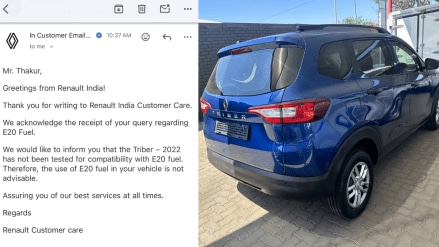E20 fuel: Renault has walked back on its earlier stance regarding the use of E20 fuel in its 2022 models. In an email to a Triber owner, the company had stated that “E20 fuel is not advisable” for the vehicle. In response to FinancialExpress.com’s query on E20 fuel in 2022 vehicles tested and certified for E10, the company stated that using E20 fuel poses “no serious challenges”.
Renault reverses stance on E20
The French carmaker said that the clarification was necessary since many customers raised concerns regarding the fuel. The company said that Renault Triber’s 2022 model was approved for E10, per the “prevailing norms” at that point in time. However, those specific models were tested for E20 as well, and the study noted that there’s no “adverse impact from using E20 fuel in E10-compliant vehicles”.
“As per the then prevailing norms, E-10 was the declared fuel for the purposes of Type Approval and Production tests of the said Renault Triber (Model 2022),” the company said in a statement to FinancialExpress.com.
It added, “To answer the specific query on E10 compliant cars, a rigorous durability testing was conducted jointly by Indian Oil Corporation (IOC) and ARAI, involving various fuel combinations, including the use of E20 fuel in vehicles certified for E10. The draft report of this study, shared with all OEMs (Pursuant to MoPNG letter No. P-13045(18)/19/2017-CC(E-13946)), while acknowledging that the present on-road vehicles are compatible with E20, concluded that there is no adverse impact from using E20 fuel in E10-compliant vehicles.”
The company told FinancialExpress.com that models tested for E10 are safe to use E20 fuel.
“Based on these findings, no serious challenges have been perceived in Renault cars plying on roads using E20 fuel in E10-compliant and tested vehicles,” it further said.
‘E20 fuel not advisable’: Renault to Triber 2022 model
FinancialExpress.com earlier reported that a Renault Triber 2022 owner, Ankur Thakur, received an email from the company after he sought clarity on whether his car was compatible with the newly introduced E20 fuel – petrol blended with 20% ethanol.
Thakur had purchased his Renault Triber in April 2022, when E10 fuel was the standard. On August 24, he wrote to Renault seeking clarity. And the response left him helpless as he asked, “What should I do now?”
Thakur explained that his car had run just 13,000 km in three years.
“Thank you for writing to Renault India Customer Care,” the email from Renault India began.
The company clarified that the 2022 Renault Triber had not been tested for compatibility with E20. “We acknowledge the receipt of your query regarding E20 Fuel. We would like to inform you that the Triber – 2022 has not been tested for compatibility with E20 fuel,” the email stated.
The company went on to say, “The use of E20 fuel in your vehicle is not advisable.”
Renault advises against using E20 petrol in my 2022 car. What should I do now? This is a new car and we’ve done just 13000 kilometers in 3 years.@nitin_gadkari @PetroleumMin @HPCL @BPCLimited @ChairmanIOCL @IndianOilcl @volklub @kapsology pic.twitter.com/LJwcaa3oWW
— Ankur (@iAnkurThakur) August 25, 2025
Renault currently sells three models, Kwid, Triber and Kiger, in India.
E20 improves acceleration and ride quality: Govt
The Centre has introduced E20 fuel to reduce dependence on oil imports, and inch closer to its Net Zero 2070 goal. It will also strengthen the country’s farmers, which in turn would boost our economy.
E20 not only improves acceleration and ride quality but also reduces carbon emissions by 30% compared to E10, the government said.
“The use of E-20 gives better acceleration, better ride quality and most importantly, lowered carbon emissions by approximately 30% as compared to E10 fuel. Ethanol’s higher-octane number (~108.5 compared to petrol’s 84.4) makes Ethanol-blended fuels a valuable alternative for higher-octane requirements that are crucial for modern high-compression engines…. Ethanol’s higher heat of vaporisation reduces intake manifold temperatures, increasing air-fuel mixture density and boosting volumetric efficiency,” the government explained.
⛽️#Biofuels and Natural Gas are India’s bridge fuels. They represent a viable, non-disruptive transition towards meeting our commitments to a greener world and are in line with our Nationally Determined Contribution (NDC) wherein India has signed up to Net Zero by 2070. A study…
— Ministry of Petroleum and Natural Gas #MoPNG (@PetroleumMin) August 12, 2025
MoPNG further said, “The critiques suggesting that E20 causes a ‘drastic’ reduction in fuel efficiency are misplaced. Vehicle mileage is influenced by a variety of factors beyond just fuel type. These include driving habits, maintenance practices such as oil changes and air filter cleanliness, tyre pressure and alignment, and even air conditioning load.”
The Centre stated that taking a step back would mean losing “hard-fought gains on pollution”. The ministry pointed out that automakers had a four-year window to adjust vehicle technology and supply chains.
